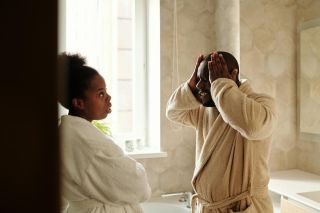Relationships
Signs You Should Attend Couples Therapy
Don’t wait. Now is the time to get help.
Posted January 23, 2024 Reviewed by Ray Parker
Key points
- Couples wait an average of six years of being unhappy before getting help.
- If a couple waits too long, their problems naturally get worse.
- Recognizing the warning signs that require you to attend couples counseling is essential.

If you were to break your leg or injure your knee, how long would it take for you to go and take care of your health? I assume that you won't wait too long. Yet, according to John Gottman, a relationship and marriage expert, couples wait for an average of six years of being unhappy before getting help. Can you imagine what happened during that time?
Simply said, couples have years to build up anger, frustration, and resentment before they begin to work on the relationship and attend couple counseling to save their relationship and learn practical couple skills.
When a couple cannot solve their issue alone yet avoid professional help, their problems amplify. This is why it is important to realize the value of counseling and attend therapy as soon as couples recognize signs that their relationship is in trouble.
Warning signs that require you to attend couples counseling
Below are the main warning signs that you need to look out for and hurry to attend couples counseling before it is too late.
Control and domination
It is very destructive when your partner is dominant, controlling, manipulative or abusive. These negative dynamics also take place when the dominant partner in a relationship holds power and sanctions most of the ongoings of the relationship.
Lack of intimacy
Lack of emotional and physical intimacy will create distance and indifference, and sooner or later, one or both individuals will fall out of love. Lack of intimacy can give rise to feelings of neglect, loneliness, and emotional disconnection.
Superiority and criticism
Contempt comes from a place of superiority and makes the other feel inferior. It takes place when your partner puts you down and criticizes you or when you feel unappreciated or unacknowledged. By actively respecting each other, couples can foster an environment of equality and care.
Blame or victimization
If your partner blames you for many things that have happened or acts as a victim, it drives the relationship downhill. The negative cycles of blame and victimization also prevent accountability and make it hard for the relationship to improve.
Negative communication
Negative communication may include anything that has negative intentions or energy that leaves one partner feeling judged, shamed, disregarded, or wanting to withdraw from the conversation. Healthy communication skills help couples express their thoughts, feelings and needs constructively.
Power struggle
When you feel that you are always in competition, and you want to prove that you are right. You constantly argue, and no compromise takes place. Power struggles can be detrimental to even the most loving relationships. Assertive communication and choosing to love are the starting points in preventing and resolving power struggles in a relationship.
Conflict escalation
Conflict and disagreement are a part of any relationship. Yet, when unresolved conflict escalates, it becomes detrimental to the relationship. Therapy can help build appropriate skills to de-escalate conflicts and resolve disagreements in a healthy way.
No trust
Trust is the foundation of a healthy relationship. Lack of trust may include lies, secrets, dishonesty, and not keeping your agreements. Establishing trust creates a strong bond and foundation to build on. Also, when you trust each other, you feel increased closeness and safety, and intimacy is enhanced.
Vicious cycles
You feel like you're in a deja vu movie when you argue over the same things repeatedly. Partners may not even understand why these fights keep happening and what they can do about it. A counselor can help a couple figure out the root of the issue and how to break the negative cycle.
Invalidation
Invalidation is dismissing or rejecting someone's thoughts, feelings, or actions. Invalidating someone's emotions can cause deep emotional pain and damage the relationship. On the other hand, validation promotes more openness and vulnerability, which is a key component of intimacy.
Addiction
Any addiction to drugs, alcohol, sex, gambling, etc., dramatically alters the character and conduct of the addicted person and negatively impacts the quality of the relationship. If the addiction in the relationship is not treated, it can set the stage for continued conflict.
Sexual concerns
Sex is an important part of intimacy, and mutuality and enjoyment of sexuality are critical. Yet, many couples are challenged to have fulfillment in their sexual life. They also have difficulty talking about sex. Sex therapy as a standalone or as part of couples therapy can definitely improve your love life.
Experience trauma
Trauma creates a feeling of powerlessness and lack of safety. It can cause extreme reactions that don't match the current situation. Whether it is the loss of a loved one, illness, or another traumatic experience, counseling can help couples heal after trauma.
Severe Jealousy
Feeling a little jealous is normal, but it gets draining and even toxic if it reaches an extreme level. It might be an indication of insecurity or lack of trust. If left untreated, jealousy can create a serious block between you and your partner while negatively impacting the relationship.
Infidelity or affair
Whether it was an emotional affair, sexual betrayal, or merely a step in that direction, couples therapy can be critical in navigating this very difficult situation and helping couples to heal and repair after an affair. If not treated soon, the effects of such a betrayal can be long-term and devastating.
Major life changes
Relationships naturally change and evolve over time. Yet, there are times that couples are faced with a major transition, such as when you're expecting your first child or when you lose your job or a family member. A psychotherapist can help you navigate the life changes and find a new healthy balance.
Can't get along
Some couples fight like cats and dogs without even really knowing why. They find themselves constantly arguing with one another. A therapist can help you realize the negative patterns and equip you with tools to break these patterns to find greater peace and harmony.
Major financial disagreement
Money is a serious matter and can damage a relationship if not handled wisely. Money in relationships is not just about numbers. Money represents emotions, beliefs, and behaviors, which are all very personal. Financial counseling for couples helps both partners understand each other's "money mindset" to better understand each other's perspective.
Divorce consideration
Counseling is often viewed as a last attempt to save the marriage. Unfortunately, this issue is often discussed too late. As such, I advise couples to seek counseling before they reach a "point of no return" in the relationship and save their marriage.
These are some of the most common issues that bring couples into therapy, but there are many more possible reasons. Regardless of your reason, don't be afraid to explore therapy. Attending couples counseling means you are committed to improving your bond and working through your issues as a team. If a couple waits too long, their problems naturally get worse, making the relationship very difficult. Couples therapy can help you build the necessary skills to create healthy and prosperous relationships to bring greater happiness into your life.
To find a therapist, visit the Psychology Today Therapy Directory.




